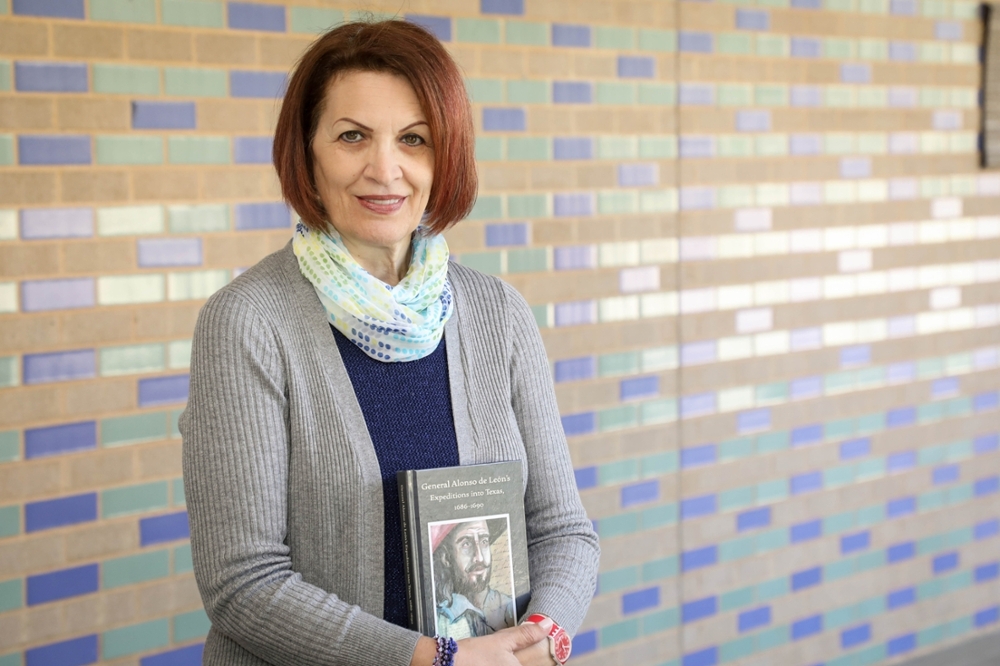TAMIU Professor Publishes First Book

Scholars and enthusiasts of Spanish Texas will now have a better understanding of 17th Century Texas thanks to the hard work and dedication Dr. Lola Orellano Norris, assistant professor of Spanish at Texas A&M International University, poured into her new book, “General Alonso de León’s Expeditions into Texas, 1686-1690” (Texas A&M University Press).
The book will be released Monday, April 24 and available for purchase at online retailers.
“I became fascinated with archival research and Spanish paleography during my doctoral studies at Texas A&M University in College Station. I took classes in colonial Spanish paleography with Dr. Brian Imhoff and in historical linguistics with Dr. Nancy Joe Dyer and started transcribing and analyzing Spanish colonial manuscripts. I became very interested in the early expeditions into Texas during the late 17th Century, particularly those by Alonso de León, because they were brought on by French explorer La Salle’s unsanctioned settlement on the Texas coast,” said Dr. Orellano Norris.
In what was to become her first book, Dr. Orellano Norris transcribed, translated and analyzed 16 manuscript copies of de León’s meticulously kept expedition diaries. It is the first time all 16 manuscripts have been studied.
“While delving into Spanish Texas history, I noticed discrepancies between some of the accounts published in English and the primary sources, the 300-year-old handwritten Spanish colonial manuscripts. The more I researched, the deeper I dug, the more absorbed I became with the topic and the more I felt that my findings could contribute to a better and more precise understanding of early Texas history,” said Orellano Norris.
Orellano Norris worked on the project for years and visited archives in Spain, México and the U.S.
“One thing that surprised me about the subject was how detailed the journals were. These were rather large military expeditions in search of French enemies who had settled in lands claimed by the Spanish crown, but they were also exploratory journeys through uncharted territory that afforded De León’s party the opportunity to see the region for the first time.
“The general was charged with keeping very detailed accounts with daily entries that contained the direction in which they traveled and approximate distances marched. He included geographical features, descriptions of flora and fauna, as well as commentary about their encounters with different indigenous peoples. Some of the entries are terse, but most of them offer fascinating observations on the region that would later become Texas,” she said.
All those details gave Orellano Norris plenty to work with.
“Archival research is time-intensive. It was a very long process which included searching for and locating the 16 colonial manuscripts,” said Orellano Norris.
After identifying the manuscripts, Norris had the task of transcribing the texts from what she called “often almost undecipherable Spanish handwriting.” Then she submitted them to a rigorous linguistic analysis and examination of the different copies of the handwritten documents which had been written by different scribes. After that was complete, Norris translated them into English, compared them to extant publications and finally got to write the actual book.
“The most challenging part about writing this book was also the most exciting one: the research itself, the ‘detective work,’ searching for the manuscripts, finding out things you didn’t know through the process of inquiry, going down a rabbit hole on a hunch and actually finding something no one had seen or studied before,” Norris said.
Surprisingly, Orellano Norris had to work through a problem which most might not associate with published authors.
“Another challenge during the actual writing process was the fact that I am a slow writer. I am not a native English-speaker, but I am a perfectionist. I write and rewrite paragraphs 10 times or more before I am satisfied,” Orellano Norris admitted.
Giving up was not an option. Orellano Norris is not the type to back away from a challenge. When she began her doctoral studies, she was a single mother to six children with her late first husband, Reymundo “Tigre” Pérez, working full-time and taking classes full-time.
She earned TAMIU’s first Master of Arts in Spanish in 1999 and was the first doctoral graduate from TAMIU in the collaborative Ph.D. program in Hispanic Studies with Texas A&M University in 2010.
“It is truly an awesome feeling to see my book in print. I can’t compare it to anything else. It is exhilaration, but also the feeling that after so many years of hard work and dedication I have something to show for it. It also makes me happy that, in small measure, I have contributed to scholarship, to a better understanding of Spanish Texas.
“I also found the publishing process quite exciting. The experts at Texas A&M University Press who worked with me were just amazing, very professional. As a first-time author, I had no clue how complex the entire process was, but they walked me through all the steps and were very supportive throughout. It was truly a great experience that taught me, among many other things, how important deadlines are. I am very proud that I got to publish my first book at TAMU Press,” she said.
Orellano Norris is currently working on two other books, editions of literary translations, including a translation of short stories by Dr. José Cardona-López, professor of Spanish at TAMIU, and a collaboration with Dr. Ray Keck, former TAMIU president.
“Once I am done with these projects, I want to get back into archival research on Spanish Texas. There are several other topics I am interested in and the archives are full of manuscripts just waiting to be discovered and studied,” Orellano Norris said.
Orellano Norris’s research is interdisciplinary. She said she hopes her book sparks further research.
Perhaps her work could even encourage further collaboration with her colleagues.
“The faculty and staff in the Department of Humanities have been very supportive throughout the process. I am very grateful to work in such an encouraging environment,” she said.
Orellano Norris is married to TAMIU associate professor of political science, Dr. James A. Norris.
For more information contact the Office of Public Relations, Marketing and Information services at prmis@tamiu.edu or 326.2183 or visit offices in Sue and Radcliffe Killam Library 268.
University office hours are 8 a.m. – 5 p.m., Monday – Friday.
Additional information is also available at www.tamiu.edu and on Facebook, Twitter, Instagram and YouTube.
